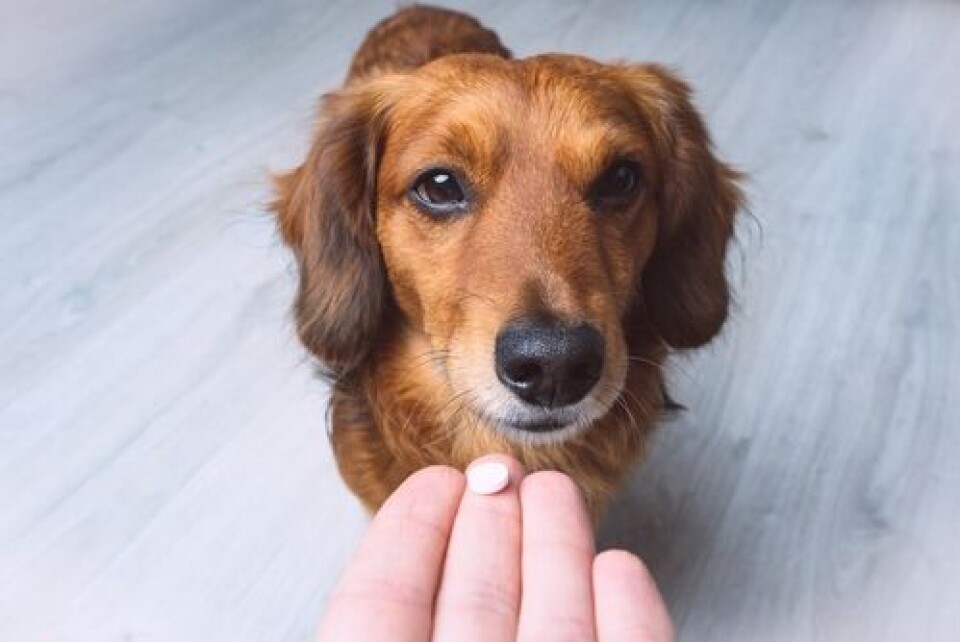-
Occitanie copper phase-out ramps up – how it will affect residents
There are some simple steps you can take to prepare for the switchoff
-
Which cars are stolen the most in France and why?
Perhaps surprisingly, the higher-end vehicles are not the most targeted
-
Several wolf sightings in centre of Frejus, Var
Rules have been relaxed around shooting wolves that threaten livestock
Don’t give human drugs to pets’ alerts French health safety agency
Paracetamol, aspirin, ibuprofen, and antidepressants can all be fatal to pets, said the Anses health authority

Pet owners have been warned over giving drugs to their animals that are intended for human consumption.
Paracetamol, aspirin, ibuprofen and antidepressants can all be fatal for pets, according to the Anses health safety agency.
The problem is often the dosage levels of pills, said the agency. It said it was easy to accidentally give a pet an overdose because they tend to be much smaller and lighter than a typical adult human.
However, the dosage is not the only problem.
“Even if you adjust the dose to the animal’s size, the risk of intoxication still exists [because] they do not have the same metabolism as humans,” said Anses.
“Cats do not have the right enzyme needed to digest paracetamol, while dogs and other pets have very little of it.
“The active ingredient therefore accumulates in the blood, and can cause unwanted effects.”
Giving these drugs to pets can be fatal, especially for cats. Even in larger pets, it can cause severe kidney and liver problems.
Ibuprofen and aspirin have also been linked to “digestion, kidney, and neurological issues, which can lead to coma and death”, Anses said.
‘If in doubt, go to a vet’
Anses explained that pets should not be given anti-anxiety and antidepressant medications intended for humans, even by well-meaning owners who fear that their pet is sad or anxious.
It said pets should only consume drugs that a vet had prescribed specifically to that animal.
If in doubt, owners are urged to visit a vet.
Vets may prescribe medication that is also used for humans, but they will do so in a way that is tailored to the pet, taking into account their size, condition, weight, age, breed, and other medications or allergies.
What if my pet accidentally takes human medicine?
Owners are warned not to leave medicines loose or in areas where pets could accidentally find and eat them. The best thing is to lock medicines away or place them in a high-up cupboard that your pets cannot get to or open.
However, if your pet accidentally takes human medicine, or if they experience unexpected and unwanted side effects from a vet-prescribed or animal medicine, you should:
-
Alert your vet and take your pet to the nearest veterinarian clinic or animal anti-poison clinic as soon as possible
-
Report the issue online, on the national pharmacovigilance vétérinaire website
-
Submit a form to the centre de pharmacovigilance vétérinaire de Lyon (CPVL). The forms are available on the website linked above
-
Report the issue to the CPVL on 04 78 87 10 40.
Contract for pet responsibility
Since October 1, 2022, people adopting or buying a pet in France have been required to sign a contrat d’engagement et de connaissance (contract of commitment and recognition) to show that they understand the needs, responsibility, and financial commitment of owning an animal.
The change is the result of a 2021 law that aims to tackle the mistreatment of animals and educate owners about their responsibilities towards their pets.
Each year, some 100,000 pets are abandoned in France, so the government has recently been eager to put measures in place to deter people from buying or adopting animals on impulse.
Read more: Rising inflation blamed for increase in pet abandonment in France
The contract contains information about the animal’s behavioural and physiological characteristics, associated costs, and needs. It is needed whenever the owner has not owned a pet of that species before, such as a dog or cat.
It must be provided by the animal’s previous owner, breeder, vet, or animal rescue centre handler seven days before the new owner receives their pet. This allows for a cooling-off period to help prevent rash decisions. The new owner must sign it and promise to respect the animal’s needs.
It should be specific to the animal species but does not have to be detailed with regard to a particular breed or animal.
You can find examples of the contracts – applying to different species – online by searching ‘contrat d’engagement et de connaissance exemple’ or similar. Some are found at the bottom of this SPA refuge page.
Read more: Do France’s new pet owner ‘contracts’ have any actual weight?
Animal mistreatment sanctions
Someone who is found to have mistreated an animal – for example by depriving it of food and water or not tending to it when it is hurt – faces a €750 fine and could have the pet taken from them.
Abandoning an animal, meanwhile, is punishable by up to three years in prison and a €45,000 fine.
In addition, abandoning an animal in a situation in which the animal’s life is in danger is punishable by up to four years in prison and a €60,000 fine. If the abandonment led to the animal’s death, the person responsible risks up to five years in prison and a €75,000 fine.
You can find out more about the different animal-related offences and punishments on the government Service-public.fr website, which also explains how you can report mistreatment to the relevant authorities.
Related articles
France imposes new rules to stop rash pet purchases and avoid neglect
France launches €20m action plan against animal abandonment
France’s new animal welfare law passes: What will it change for pets?
























